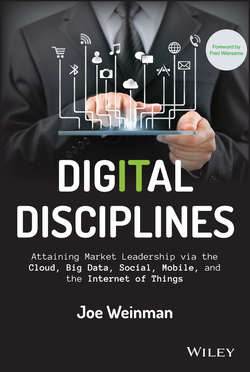Читать книгу Digital Disciplines - Wiersema Fred - Страница 18
На сайте Литреса книга снята с продажи.
Part One
Overview and Background
Chapter 2
Value Disciplines and Related Frameworks
Operational Excellence
ОглавлениеTreacy and Wiersema defined operational excellence as “providing customers with reliable products or services at competitive prices and delivered with minimal difficulty or inconvenience.”41 They cited Dell, which at that time had disrupted the PC industry by offering a direct-to-consumer, make-to-order business model. The insight here is that the product itself – an Intel-based PC – was not really differentiated; it was the processes for configuring it, ordering it, paying for it, and taking delivery of it that were reimagined.
The concept of operational excellence can be broadly viewed as addressing process efficiency – doing things right – and process effectiveness – doing the right things. It can be viewed in terms of cost and convenience, but also in terms of all the ways in which processes can be differentiated: higher quality, higher reliability, shorter cycle times, lower risk and variance, greater flexibility. In some cases, internal process changes, such as maximized throughput, can contribute to customer value, such as lower cost.
Also of importance: accountability, transparency, and traceability; supplier employment practices; governance; sustainability, whether green data centers or sustainable forestry; environmental concerns, such as toxins and emissions; safety; social responsibility, such as offering living wages and eliminating child labor; locality, for example, locally grown food; ethics and fairness, such as fair trade coffee; and other values. Concepts like convenience have additional subtleties. In some contexts and for some segments, self-service is more convenient; in others, service delivery is. For some products and services, instant gratification is convenient. For others, such as using a car service to go to the airport, (delayed) synchronization between the firm and the customer process is more “convenient.”
The value of different process metrics often depends on the specific type of process. For example, consider a sales process versus a manufacturing process. Important characteristics of a sales process might be close rate and sales funnel forecast accuracy. Important ones for a manufacturing process might be cycle time, yield, and compliance.
The notion of process excellence can then be further extended to include business effectiveness: greater customer advocacy and engagement in a customer relationship management process; higher revenues or forecast accuracy for a sales process; greater customer satisfaction for a service delivery process; and lower employee turnover for a talent acquisition process. We can extend revenue generation beyond sales, and also consider how existing processes can move from being cost centers to revenue generators by monetizing physical or information byproducts.
It should be noted that operational effectiveness and efficiency are not the same as operational excellence. To excel is to stand out and be the best – in other words, to be differentiated. Having efficient and effective operations is a good goal, but might not be enough to differentiate a firm.
41
Ibid., 84.
